Second Interim Report of Long-Term Election Observation: Daily Pressures and Perpetual National Themes
 Photo – Media Centar
Photo – Media Centar
The conclusion of the campaign for the Belgrade elections is marked by chronic electoral issues – blurring the line between state and party, increased voter pressure, more unscrupulous manipulation of vulnerable population groups, and misuse of public resources for party promotion. These findings are detailed in the Second Interim Report of Long-Term Election Observation, which the CRTA Observation Mission presented to the public today.
Long-term observers have recorded instances that indicate new red lines being crossed in the fight for political points, including the exploitation of children from a kindergarten who were taken to a campaign rally instead of a children’s play. Information has also been gathered pointing to undue influence targeted at the socially disadvantaged and citizens with outstanding debts to public utility companies.
“There has been no improvement in the conditions and behavior of campaign actors and state institutions compared to December,” said Raša Nedeljkov, head of the CRTA Observation Mission. “The dialogue on improving election quality and implementing ODIHR recommendations was halted before achieving significant results.”
In the capital, the intensity of campaign activities increased in the second half, but local issues remained overshadowed by major national topics, including messages such as “We are not a genocidal nation.”
“The campaign gives the impression of national or presidential elections, not a race for city council seats,” concluded Tamara Branković, deputy head of CRTA’s mission. “Such content and tone of the campaign have been imposed by the authorities, further erasing the boundary between state and party.”
By May 27, observers recorded over 700 instances of high-ranking state officials participating in party activities, as well as 97 cases of public resource abuse, ranging from the use of vehicles and premises of public institutions for party needs to the use of public institution symbols in promotional videos.
“Throughout the entire pre-election period, mostly in the last two weeks, we submitted 46 complaints to oversight and regulatory bodies,” said Pavle Dimitrijević, head of CRTA’s Legal Team. “The responses of these institutions range from none, as in the case of REM, to slower and even more sporadic than before, in the case of the Anti-Corruption Agency.”
There is still justified concern among the public regarding the state of the voter registry, as relevant institutions have not provided clear evidence of the accuracy of voter records, and all unlawful manipulations of the voter registry from previous elections remain protected by the practice of impunity.
Despite the limited verification ability CRTA had, it determined that the provision requiring voters who changed their residence between local government units after July 3, 2023 to vote in their previous municipality or city of residence in the June 2 elections was not consistently implemented.
The trend of extreme inequality in media coverage continues. Media monitoring shows that the ruling majority received 93% of the airtime in programs of national broadcasters.
You can find the summary of the report here.








